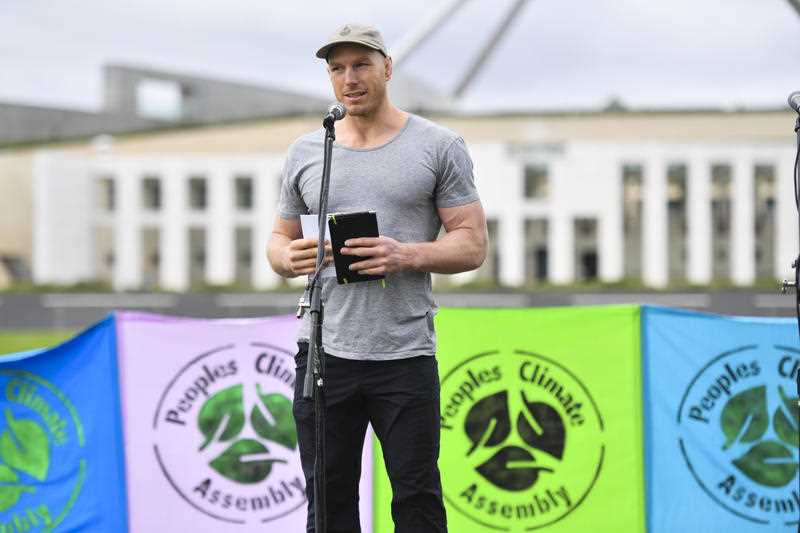Key independent senator David Pocock, who represents the ACT, received just under $1.7 million, including $856,382 from the Climate 200 group, ahead of last year’s federal election, the Australian Electoral Commission’s 2021/22 financial disclosure returns from parties, candidates, donors and organisations shows.
By comparison, billionaire Clive Palmer pumped a record $117 million into the United Australia Party for its election campaign.
The AEC data shows Mr Palmer’s Mineralogy mining company donated the staggering figure, including individual donations of $50 million and $30 million.
It is the most money an Australian political party has received in one year, beating the UAP’s record from the 2019 election where it got $89 million.
This year’s huge spend bought an underwhelming return for the UAP, with Victorian Ralph Babet winning the party’s sole Senate seat, while it received four per cent of the national lower house primary vote.
Mr Palmer also donated $250,000 to the Liberal Democrats in mid-December 2021, a few weeks after announcing a preference deal with the minor party which campaigned against COVID-19 vaccine mandates.

The AEC’s data shows Labor took $124 million in donations, while the coalition took $118 million.
The Greens, who received $22 million, continue to call for coal and gas companies to be banned from giving money and a $1000 cap on all donations.
In a media statement issued today, Senator Pocock’s office said the David Pocock party was established to enable his candidacy to appear ‘above the line’ on the Senate ballot paper, where some 81 per cent of Canberrans cast their vote.
“In total, the David Pocock party received $1.7 million in donations, both cash and in kind, from 768 donors,” the statement continued. “The two ACT Senate seats encompass three federal electorates and have never been held by anyone other than Labor or Liberal senators.
“Climate 200’s total cash and in-kind contribution to Senator Pocock’s campaign amounted to $856,382. Of Climate 200’s 11,200 donors, 1,596, or fourteen per cent, of them were from the ACT.
“The largest contribution from an individual donor to Senator Pocock’s campaign was $224,000. Many supporters set up small regular donations and together with an army of 2,200 local volunteers, helped elect an independent candidate for the first time in the ACT,” the statement read.
An analysis by the Centre for Public Integrity showed that Australia-wide, the top 10 donors contributed 76.9 per cent of all donations over the year.
The 10 individual donors, topped by Mineralogy, contributed $137.5 million to parties and independents.
Spending at the federal election reached a record $439.4 million.
“The undue influence of money in politics is getting worse,” the centre’s Anthony Whealy said.
“Record high spending fuelled by a handful of donors is putting our democracy at risk.
“Given the reliance that the major parties have on these top donors, there is a real risk that they receive special access and yield undue influence on our decision makers.”
In late 2022, Greens senator Larissa Waters brought to parliament a bill to ban coal and gas corporation donations and cap all other donations at $1000.
Other industries covered by the ban would include gambling, banking, defence and pharmaceuticals.
The Greens say Labor and Liberal policies are shaped by donations from big industries, pointing to slow action on climate change and hesitancy over financial reform.
The minor party also wants real-time disclosure of donations, lower disclosure thresholds and better data, rather than waiting 18 months for a complex dump of information.
In a submission to a parliamentary inquiry into the 2022 election, Labor backed real-time disclosure and reducing the disclosure threshold from $15,200 to $1000.
It also called for caps on electoral spending, but said the changes needed to be carefully considered.
The Liberals say real-time disclosure could put too much of a paperwork burden on parties and candidates, as well as lead to bullying or harassment of donors during elections.
“When you look at the amount of money spent by the major parties, and who they are accepting donations from, I think it highlights the urgent need for reform,” Senator Pocock said.
“We know that companies seeking to buy influence is not good for our democracy.
“Donations are necessary to run a campaign but I put guidelines in place for my campaign donations and who I would accept donations from.
“Today we see that the major parties once again accepted hundreds of thousands of dollars worth of donations from fossil fuel companies, developers, banks, alcohol and gambling companies and their representatives – people with clear vested interests in key national policy debates.
“States and territories already have far stricter laws around political donations and people want this addressed at a federal level.”
By Paul Osborne and Alex Mitchell in Canberra, with Newstime Media



